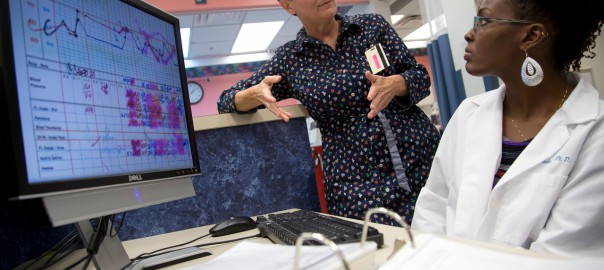Data Analytics classes at St. Petersburg College provide foundational material needed to begin a career in data analytics. Specifically, the classes prepare you for the SAS Base Programmer certification, an extremely valuable industry standard that makes you highly marketable. Offered as sub plan in the Technology Development and Management Bachelor of Applied Science degree, classes opened for the new sub plan this fall.
Data Analytics sub plan gives students #1 job skill
Just this year, Money magazine named SAS knowledge (Statistical Analysis System) #1 out of the top 25 most desirable job skills in the country.
Top data skills and their average pay boost (source: Money Magazine):
- SAS (Statistical Analysis System): +6.1%
- Data Mining/Data Warehousing: +5.1%
- Data Modeling: +5%
According to Peter Sondergaard, senior vice-president of Gartner Research, “There is not enough talent in the industry…data experts will be a scarce, valuable commodity.”
Data Analytics sub plan courses
The sub plan is composed of five courses:
- Business Intelligence
- Data Mining
- Web Analytics
- Data Analytics Technologies
- Data Analytics Management
With the introduction of the sub plan, St. Petersburg College is on the cutting edge of education for data analytics, as few universities and colleges have established data analytics bachelor’s programs.
SPC Partners with SAS to provide free training
We are actually partnering with SAS to provide students thousands of dollars’ worth of free training. In one class alone SAS is providing free access to $1250 worth of training. They have an excellent system for preparing students for their certification. We’re excited!
In addition to SAS training, the sub plan focuses on foundational concepts and hands-on skills using applications such as Tableau, Excel Analytics, ArcGIS, and Google Analytics.
Apply now to St. Petersburg College. Spring 2017 term registration opens soon.
 Dr. Nathan Heinze teaches technology classes on St. Petersburg College’s Tarpon Springs Campus and helped develop this new subplan. He has a Ph.D. in Business Administration (IT emphasis), a B.S. in Instructional Technology and an MBA in Management Information Systems. Read more articles by Dr. Heinze or visit his faculty profile to read his full biography or see what classes he is teaching this term.
Dr. Nathan Heinze teaches technology classes on St. Petersburg College’s Tarpon Springs Campus and helped develop this new subplan. He has a Ph.D. in Business Administration (IT emphasis), a B.S. in Instructional Technology and an MBA in Management Information Systems. Read more articles by Dr. Heinze or visit his faculty profile to read his full biography or see what classes he is teaching this term.


